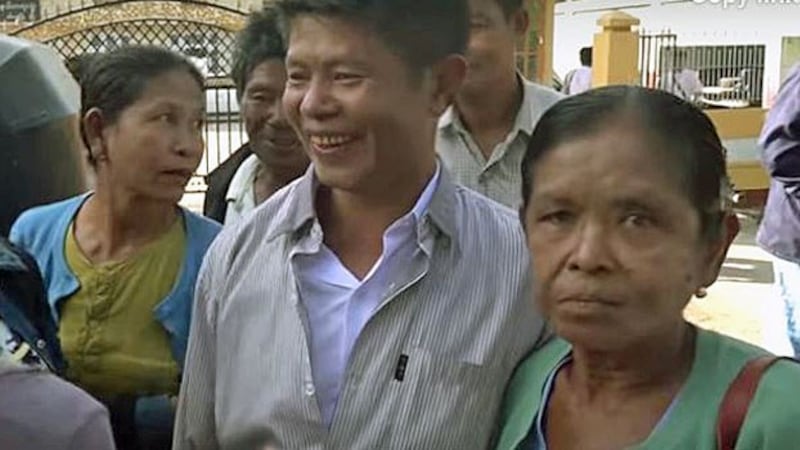Amid fighting between national forces and the Arakan Army (AA) in Myanmar's northern Rakhine state, the global humanitarian organization International Rescue Committee (IRC) said it has decided to end its food program in the state because of government restrictions on staff movements.
On Jan. 6, the IRC ended its Tat Lan program that provided sustainable food security and improved nutrition and livelihoods to villages in Rakhine’s Myebon, Pauktaw, Kyaukphyu, and Minbya townships.
An announcement by the organization said the program ran for more than five years and had provided livelihoods and food security for more than 56,000 people, but that the Rakhine state government instructed IRC to cease operations in 2018, though it continued its activites.
IRC staffers were denied travel permission because they were recruiting journalists, said Win Myint, Rakhine minister of municipal affairs.
“They were recruiting the journalists, [and] we didn’t know what their intention was,” he said. “This was something inappropriate. These activities were not included in a memorandum of understanding. That’s why, we stopped the operations.”
An IRC official told RFA via email that the organization invited Myanmar citizen journalists and trainees from Yangon to report on Tat Lan's activities, and it had mistakenly included employee lists when seeking travel permission in the region.
The United Nations’ Livelihood and Food Security Fund had provided U.S. $19.6 million to the Tat Lan project.
The IRC said to had to let go 60 program employees from Myebon and Minbya townships.
Court frees 12 civilians
The IRC pullout came as a Myanmar court released 12 ethnic Rakhine civilians accused by the government military of having ties to AA in Rakhine, after ruling Wednesday that they had been arrested by mistake.
Myanmar soldiers led by Colonel Khun Thar from the 81st Light Infantry Brigade arrested the civilians in March 2019 near Chaungthit village in Mrauk-U township while they were transporting a malaria patient from the Thapotsar village tract of Kyaung Taung village where they lived.
The troops also detained the malaria patient, Hla Maung Win, also known as Nyi Pu Chey, who died in custody.
The remaining 12 were charged by deputy police commander Aung Thura of the Mrauk-U police station under two sections of Myanmar’s Counter-Terrorism Law and spent 10 months in prison while awaiting trial.
AA commander-in-chief major General Tun Myat Naing, deputy commander Nyo Tun Aung, Brigadier General Kyaw Han, spokesperson Khine Thukha, and San Shwe Maung were also charged under the same law as part of the case that the military filed against the Kyaung Taung villagers.
Authorities charged the men in absentia in July 2019 for allegedly inciting the Kyaung Taung villagers to assist the AA in its clashes with Myanmar troops. The AA leaders were also accused of involvement in a deadly January assault on police outposts and subsequent roadside bomb attacks.
The AA leaders, who were declared fugitives, face three to seven years in jail with or without a fine if convicted.
Aye Nu Sein, an attorney representing the dozen villagers, said the ruling makes sense because of a lack of evidence.
“There is no evidence supporting the charges made against the accused, so it was ruled that there was no reason to charge these people who have been detained for over 10 months,” he said. “The judge ruled that their arrest was a mistake, so they decided to release the detainees.”

Torture allegations
Eight of the plaintiff’s 17 witnesses failed to testify at the hearing, attorneys said.
“The judiciary system has worked in line with the law,” said lawyer Kyaw Nyunt Maung. “We didn’t see any pressure from the top to render a verdict in a certain way.”
“The witnesses who were present during the incident didn’t show up to testify in court, so there wasn’t any evidence to support the plaintiff’s claim,” he added. “That’s why the court released the accused.”
The 12 Kyaung Taung villagers maintained their innocence during the court hearing.
“We were taking a sick patient to the hospital, and the military arrested us along the way,” said Sithu Aung, one of the released men, adding that soldiers beat them and police tortured them with electric shocks.
“Because of the torture I was subjected to in prison, I was admitted to the hospital five times,” he said.
A Myanmar military spokesperson said the detainees had been interrogated lawfully and that authorities did not beat or torture them.
Kyaw Win Tin, father of villager Zaw Min Tun who was released, said the incarceration of his son resulted in financial losses for the family.
“There were many losses after he was arrested,” he said. “His income-generating activities were interrupted. It also caused losses for his parents. We could not perform farm work because we had relied on my son.”
Reported by Min Thein Aung and Waiyan Moe Myint for RFA’s Myanmar Service. Translated by Ye Kaung Myint Maung. Written in English by Roseanne Gerin.
